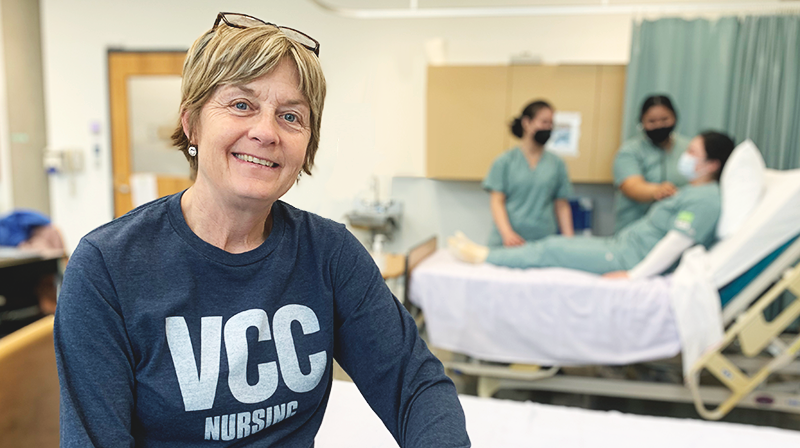Signy Novak: Moving health care forward through Medical Assistance in Dying

VCC Practical Nursing instructor Signy Novak in classroom lab with students
In many ways, medicine today is a modern wonder. We’ve eradicated historical diseases, we successfully transplant vital organs, and we developed a vaccine for COVID-19 in record time. Alongside medical advances, however, patient care also needs to evolve, and nurses like VCC instructor Signy Novak are working hard to ensure that it does.
In Signy’s case, it was the relatively recent legalization (in 2016) of Medical Assistance in Dying (MAiD) that revealed to her a lack of services and resources both for people seeking MAiD and for their loved ones.
Signy’s father David, who was himself a neurologist and often treated individuals with terminal/degenerative conditions, had long been a supporter of legalizing MAiD. In 2018, he also chose MAiD for himself. “That’s when I realized there were really no resources for family members,” says Signy. “There’s anticipatory grief and grief post-MAiD. It’s different than a natural death or a sudden death. It presents unique needs.”
At the end of her father’s life, Signy recalls his last comments to his doctor: “Keep doing the great work you are doing with MAiD.”
Based on her own experiences, informed by her professional nursing perspective, and inspired by her father’s values, in 2021, Signy founded Bridge 4 You, a national resource offering “lived experience,” connection, and support for loved ones throughout the MAiD process. Today, Bridge 4 You works with volunteers from across Canada, and the organization has also recently merged with the Ottawa-based MAiD organization Bridge C-14 to provide a full circle of care for individuals and families.
What’s next for Nursing?
Signy ensures that her students in VCC’s Practical Nursing program are aware of the latest laws surrounding MAiD and how to best support people seeking MAiD as well as their families. While MAiD is not yet required to be taught by the nursing curriculum in Canada, Signy expects to see it soon.
“VCC has been fantastic in supporting me in creating Bridge 4 You,” Signy says. “I can’t say enough about the nursing department.”
Unlike the medical breakthroughs we may see in the news, the advancement of patient care does not happen in laboratories; it happens in hospital rooms, care facilities, and in the community.
As attitudes and laws continue to change around MAiD as well as things like drug decriminalization, harm reduction, and safe supply, it will be nurses who first see and feel the needs of patients in these never-before-seen health care scenarios. Likewise, as Canada continues to reveal and challenge religious and colonial assumptions on reproductive rights, Indigenous health care, mental illness, and more, nurses will be the ones who move patient care foreward.
“Change is happening all the time,” says Signy.
In March 2021, a new Criminal Code amendment passed (Bill C-7) that removed the requirement that a person’s natural death must be “reasonably foreseeable” to be eligible for MAiD. This now provides the option to many people who are chronically ill and suffering – but not necessarily close to natural death.
While this amendment temporarily excludes people suffering only from mental illness, the legal safeguards and protocols for such scenarios are also expected to be reviewed by March 2023.
“This is our future,” says Signy. “It’s such a privilege to live in Canada where we have this option. It’s about dying with dignity on our own terms.”
Nursing resources
- Celebrate National Nursing Week (May 9-15) by learning more about the many roles nurses play in your health-care journey, and sharing your support using the hashtag #WeAnswerTheCall.
- Learn more about VCC’s Nursing programs and other career paths in the health sciences.
- Get background on the Licensed Practical Nurses Scope of Practice (Part 5: Medical Assistance in Dying).
MAiD information
Crisis line
- If you or someone you know is having thoughts of suicide, call 1-800-784-2433 (1-800-SUICIDE), or contact your local crisis centre.
